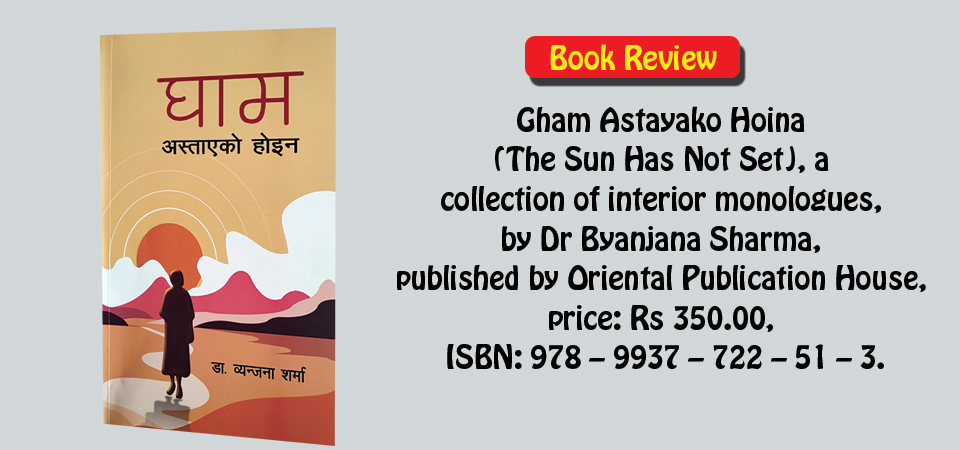Insightful Monologues

Gandhi Raj Kafle
Sometimes the literary tool of monologues becomes the best friend for writers, especially when they confront a situation like that of Dr Byanjana Sharma, the author of the under-review book, entitled, "Gham Astayako Chhaina". And, the best friend as we know does not cheat or deceive. There can be many examples, but one example to know how monologue helps as a best friend has been described in the book.
The theme of the book is not a seriously explored one. The author has not put forth a scholarly topic. The theme is life's situation, which has emerged all of a sudden to her. The passing away of Byanjana's beloved mother, when she was in a faraway country pursuing her lifetime dream of completing a PhD, is a cruel situation. She chose monologues to console herself, which helped her emerge stronger than ever. Her self-consoling monologue is the fine point of the book.
Death as a universal rule is the same and unchangeable to all. There are many Shastras and knowledge for all not to take it as an exceptional incidence no matter whose death it is. But, despite all such teachings, there are plenty of instances, where persons fail to console themselves if the death happens to be of dear ones. Dr Byanjana Sharma faces a similar situation in the death of her mother.
This book, which contains thirty-one simple and short essays, is a story of her battles to overcome irreparable grief created by the sudden demise of her mother. What does she do? Was it easy for her? Did she find true consolation to forget one of the huge tragedies of her life for engaging herself in scholarly activities of PhD courses? She is trying to find answers to these questions. She has struggled hard to rise above the materialistic spheres in her bid to calm her wounded heart. Mother, with whom she had the dream to meet after the completion of the highest university degree, is no more and in this situation, she feels extremely disappointed even with her works of PhD research. She even takes sleeping pills but fails to sleep.
Dr Sharma explains that the answers to the above mentioned complicated questions began to be simple when she firmly started to write monologue pieces to get over the grief of her mother's demise. And, what we can see in this book is that the author has not only been strengthened personally, but she has also been able to give precious answers to the grief-stricken heart in simple language.
The simple hidden truth the author has found in the disturbing moments of life is her mother has been endowed with some supreme powers of nature, too, and she confidently says with the help of this monologue that this power is not only undying but it even exists to offer inspiration to descendants like her. So, there is no need to abandon the duty of life. Life must go on, goals have to be achieved, shared sentiments must be valued and family legacies must not be abandoned, stresses the author.
How can mothers, who show the light of education, moral values and true development of their children, die? Does the sun stop rising when a mother dies? Does mother Earth become barren when the mother dies? Is it possible to forget mother's love once she dies? These are the positive questions of the strengthened heart of Dr Byanjana Sharma as she advances towards the conclusion of this monologue which she wrote in memory of her mother.
No doubt, there are gist points to learn in this book. The author values knowledge power from the Eastern Shastras and keeps the role of mother and father beyond physical perception. She is eager to talk about inter-religious ethos, too. The relief she felt through the nice words of a devotee of Ba'hai religion, Bruce uttered for his mother, words of wisdom of philosopher Socrates, songs sung by the King of Pop, Michael Jackson, and the words, 'I am God's Child' by American TV host Oprah Winfrey are some such proof.
The concluding point in the book, thus, is it is not others with whom the solution to rising from grief is available. However, other people, who console, can help and it also is precious. Author Sharma signs off by offering vital tips on how not to lose self-confidence in a time of deep grief. These tips are important for every reader.
Recent News

Do not make expressions casting dout on election: EC
14 Apr, 2022
CM Bhatta says may New Year 2079 BS inspire positive thinking
14 Apr, 2022
Three new cases, 44 recoveries in 24 hours
14 Apr, 2022
689 climbers of 84 teams so far acquire permits for climbing various peaks this spring season
14 Apr, 2022
How the rising cost of living crisis is impacting Nepal
14 Apr, 2022
US military confirms an interstellar meteor collided with Earth
14 Apr, 2022
Valneva Covid vaccine approved for use in UK
14 Apr, 2022
Chair Prachanda highlights need of unity among Maoist, Communist forces
14 Apr, 2022
Ranbir Kapoor and Alia Bhatt: Bollywood toasts star couple on wedding
14 Apr, 2022
President Bhandari confers decorations (Photo Feature)
14 Apr, 2022











